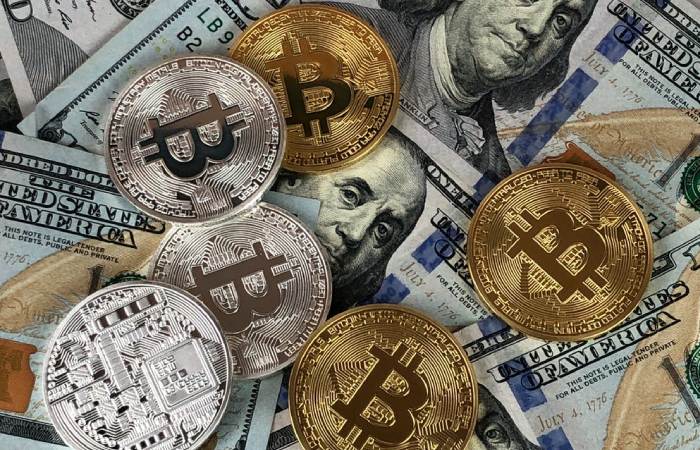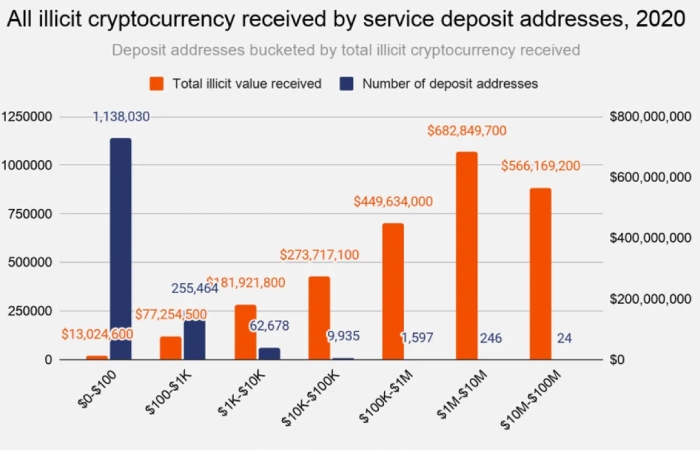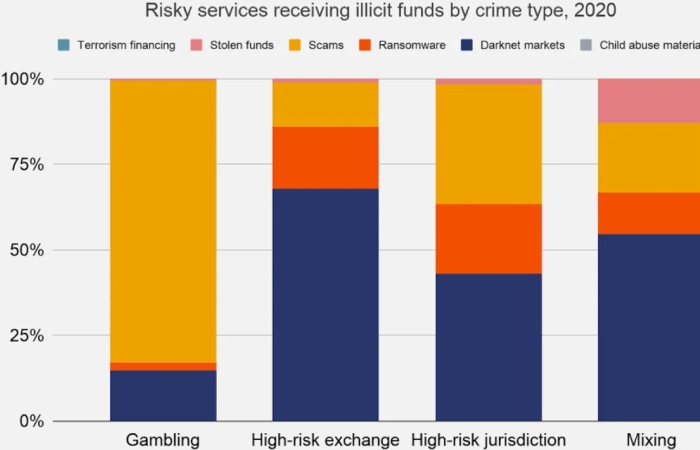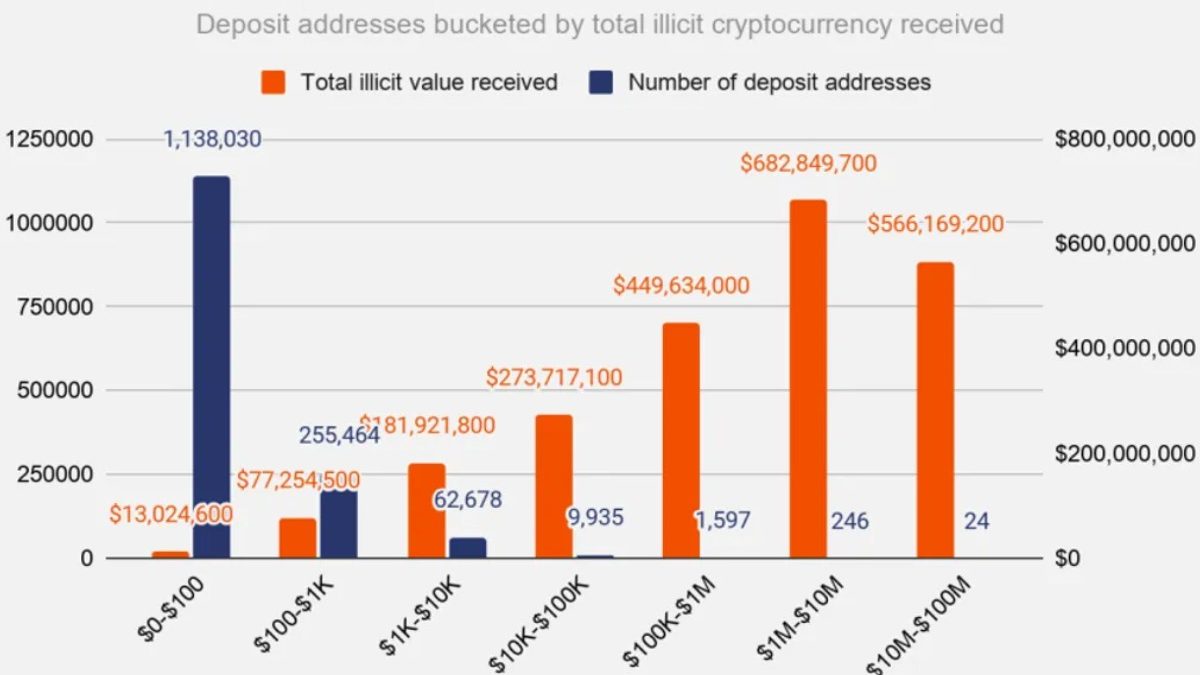270 Addresses Responsible All Cryptocurrency Money: Money laundering with bitcoin. Other cryptocurrencies are increasingly centralized in a few addresses and entities. It was reveal by a report from the blockchain research firm Chainalysis, which focus on the illicit activities associate with cryptocurrencies during 2020.
The firm’s records show nearly 2.25 billion dollars in illicit funds laundered during 2020 with bitcoin or other cryptocurrencies, distributed in almost 1.5 million addresses.
A small group of just under 2,000 addresses received 75% of the funds associated with illegal activities in 2020. Of those addresses, more than 1.3 billion dollars were concentrate in only 270.
While 500 million dollars were focus on just 24 deposit addresses, exposes the investigation publish a few days ago.
Table of Contents
Only 270 addresses received 1,300 million dollars of illegal activities—source: Chainalysis.

While during 2020 there were 55% of the funds were allocate to only 270 Addresses Responsible All Cryptocurrency Money in 2019. Those most extensive addresses received only 36% of the illicit funds during that year. The increase in one of the graphs include in the report.
We believe that the increasing concentration of deposit addresses receiving illicit cryptocurrencies reflects the growing reliance of cyber criminals on a small group of OTC brokers.
And other nested services that specialize in money laundering,” Chainalysis explains.
2019 2020 addresses amounts – 270 Addresses Responsible All Cryptocurrency Money
Increase in the concentration of illicit funds in fewer addresses between 2019 and 2020—source: Chainalysis.
Mainly, the destination 270 Addresses Responsible All Cryptocurrency Money of illicit funds belong to large bitcoin and cryptocurrency exchanges.
Through which criminals pass the money obtained into fiat or other cryptocurrencies. But we also see betting sites, platforms in “high-risk jurisdictions”, or services for mixing or obfuscating cryptocurrency transactions involved in the process.
Are Bitcoin and cryptocurrencies the preferred tool for criminals?

The Chainalysis report highlights that, despite the high volume of money received that came from illegal activities, the receiving addresses moved much more capital from legal operations
The volume of cryptocurrency from criminal activity only represents 10% of the funds received by many addresses tracked in the study. “This suggests that the money laundering facilitated by these addresses could be accidental.
Due to deficiencies in the compliance programs of the nested services that control them,” the researchers note.
As CriptoNoticias recently reported, the debate on using bitcoin and other cryptocurrencies for crime, compared to fiat money, is still very much alive today.
leader of the European Chief Bank
The leader of the European Chief Bank, Christine Lagarde, and Janet Yellen, the new United States Secretary of the Treasury, point to tight regulation of Bitcoin. They are mainly alleging its use as a tool for large-scale money laundering.
However, recent cases show how widely regulate banking entities from all jurisdictions are constantly used to legitimize capital from all criminal activities.
270 addresses are responsible for 55 per cent of all cryptocurrency money laundering

Criminals who save their assets in cryptocurrency are incline to clean aids through a minor bunch of online facilities, blockchain inquiries firm Chainalysis said in a previous week’s statement.
It contains risky (low-repute) crypto-exchange entries, online betting stages, and cryptocurrency intercourse facilities. And financial facilities that fund cryptocurrency actions headquartered in scary authorities.
Criminal action calculated in this statement contained within cryptocurrency reports connected to online fraud, attacks, terrorist funding, hacks, and dealings related to child misuse supplies.
Funds tied to expenses complete to dark web markets contribute to prohibited facilities like drugs, weapons, and data.
270 cryptocurrency addresses laundered $1.3 billion

Criminals are with a group of cryptocurrency agents and facilities to launder hundreds of millions of dollars of dirty virtual money, an investigation shared with Reuters showed on Thursday.
Just 270 Addresses Responsible All Cryptocurrency Money, many connected to over-the-counter brokers, received $1.3 billion in illicit digital currencies last year. And about 55% of all criminal cryptocurrency flows were identify by the American chain analysis firm—analysis blocks.
A cryptocurrency address is a set of random letters and numbers that represents a location on a virtual network. Bitcoin, for example, is sent from a particular address to others on your network.
Use of cryptocurrencies for money laundering
Cryptocurrencies, among which bitcoin stands out, are also being used by criminals to launder the money they obtain from illegal activities such as drugs, arms or people trafficking.
Below we will tell you what this modality of money laundering consists of and what are the challenges that countries and organizations face today regarding the use of this type of currency
How do they launder money with cryptocurrencies?
The source of cryptocurrencies, as known today, dates back to 2008 when Satoshi Nakamoto an unnamed computer operator or a group of programmers.
The article “Bitcoin: A Peer-to-Peer Electric Cash System” expressed his vision of electronic money. However, on January 3, 2009, the first cryptocurrency, bitcoin, was officially born as part of the first block of 50 BTC, called “Genesis”.


